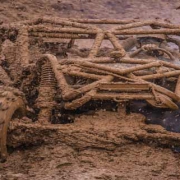Use it or lose it for African flares
Africa – just like many other regions on Earth – suffers from a double-edged problem. On one side, enormous amounts of natural gas are being flared every single day and this gas comes as associated gas to the surface with the oil that is produced at the same time. On the other side, many African countries and regions suffer energy and fuel shortages making everything difficult and expensive to do.
This holds Africa back from reaching its full economic potential and at the same time, it scorches the sky.
The solution, as so very often, looks very simple – but only on first view. Capture those flares to provide this cheap and clean energy to the locals. And so very often, this is not easy as there are myriad flares and some of them are not even easy to access. African countries typically also lack natural gas collection infrastructure of the kind that snuffed out flares in the North Sea or much of North America.
There are technological and economical solutions to this, real solutions, and many flares could be used, even economically. However, one of the most important reasons why it just does not happen is because those who own the gas are often not interested in any of those solutions being applied as it contributes very little or nothing at all to their cash flow. Hence, those who have good ideas and want the gas for local development can often not lay their hands on it.
Flare gas owners are typically not interested in the gas. They are interested in oil and burning the gas off as it represents a problem to them, not additional cash flow.
But just show them that you would like to relieve them of their burden (flaring is not free and many countries levy penalties on it) and you are set for trouble. Because the owner of the oil well and consequently owner of the flared gas will immediately want to have a hefty stake in whatever project one might want to develop out of that wasted resource.
This in turn takes the incentive for those project developers away as understandably they would like to keep the upside of the project for themselves as a reward for their strenuous efforts. The problems project developers eager to use those flares face when trying to secure the gas are such – they kill most of the sensible projects before they have even been hatched.
This is a shame as those flares should be used for better things than just lighting the landscape. Moreover, project developers should not be blamed for not coming forward if their economic incentive is blasted to smithereens by greedy oil developers. They have jumped into the deal for the oil only in the first place and if the flare burns for longer than a year with no action underway on how to use it, they have shown the world and their host country that they are not interested in the gas.
Hence, national oil regulators should relieve them of this burden and take their ownership of the gas away. Flaring penalties are a way but they are very patchily enforced if ever at all and in many cases the oil developer will consider that the penalty is a small price to pay to ensure that no third parties are stomping his grounds.
A law, obliging oil developers to either use the flare or lose the rights to it would help. Such a regulation would also have to provide useful tools that allow developers to access the gas and information on the gas if they want to. And herein lies the rub.
The oil developer has farmed in on the block making certain assumptions. One of those is that there shall be no third parties frustrating his operations. Having prospective flare gas project developers crawling his block is not an enticing prospect and will potentially cause him trouble. Having those potential project developers asking for data repeatedly causes friction and represents a workload the oil operator is not supposed to bear.
Better would be a National Flare registry where everyone who flares would have to register a set of data accessible to project developers on the internet. And the data should also respond to some predefined standards so it can be queried and used.
Also, the oil developer must be sure that there is sufficient confidentiality for his operations to soldier on smoothly. Most wannabe flare gas project concepts will never amount to more than a PowerPoint presentation anyhow so it’s easier if those wannabe’s filter out by themselves without causing unnecessary workloads. Besides, many wannabes have the best intentions and just find out in the process that the project does not fly for one reason or another.
A public database would be best as it ensures that everyone has the same set of data and that there are no boots on the ground or in the oil producers’ HQ.
Right now, serious project developers cannot get the data and cannot get the flares and this entry challenge kills lots of potential projects. As those projects tend to be very small, cash in hand is an issue and most developers simply cannot afford to pay legal teams supported by Business Development to run negotiations with multiple gas rights holders simultaneously, so they give up before they have tried.
If African governments are serious about tackling flaring and transforming those torches into something useful for the country, they must force oil concession holders to provide accurate information on the flares, give right of way to the flares plus the right of land to operate a plant on the flare and they must take rights to the gas away from the flare owner if he fails to use the gas for something useful.
Using the gas for his processes is such a thing as producing power or process heat. Increasing lift by re-injecting it into the oil field would also be such a thing. But keeping torches burning for years without any action must make him lose his rights.
There must be a sort of blackboard that informs potential project developers which flares are up for grabs, which flares are coming up, and access to the database. There must be stiff penalties for non-compliance. One could be that if they don’t comply, interested project developers may go and take samples from the flare protected by the military or police. There must be token remuneration set for project developers to pay to the flare gas owner. The gas so far had no value to him so this remuneration must be low to attract project developers.
The right kind of „use it or lose it” regime might be more potent to curb flaring than all penalties on earth. And it might also help tackle the energy problem most of these countries have. Who knows, new president Buhari might just be the right man for this kind of job.


















Leave a Reply
Want to join the discussion?Feel free to contribute!